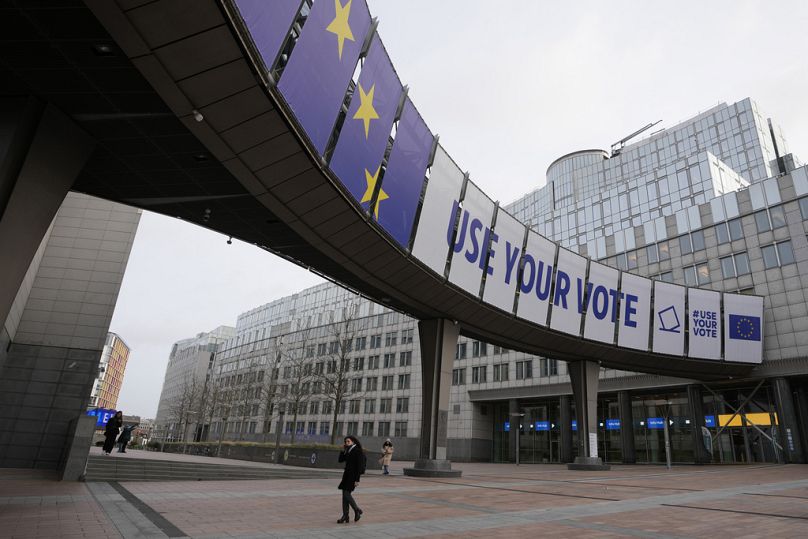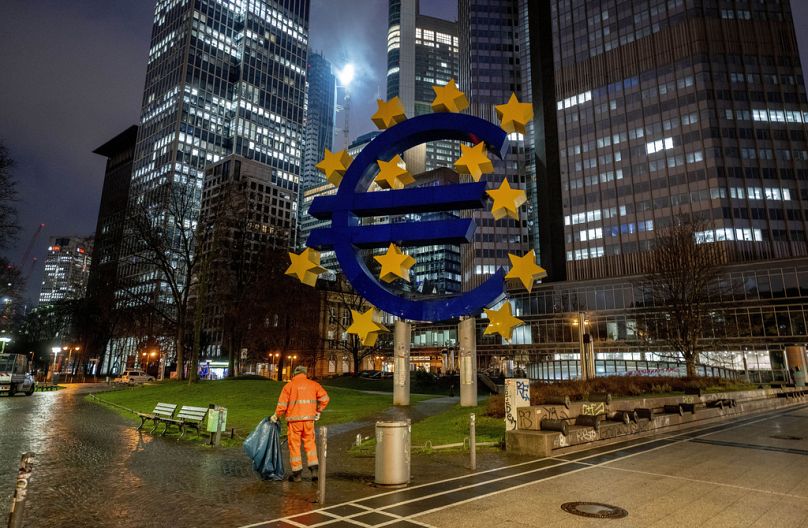Even if the digital euro began as an exploration into solving financial system friction and not just a way to outmanoeuvre the expansion of EU stablecoins, it now can evolve into something far worse, Marc Taverner writes.
The unethical and unchecked use of artificial intelligence is the threat du jour, both for those working to preserve personal freedoms and companies seeking to secure their market competitiveness.
But as we're learning, artificial intelligence analysis needs data to be effective.
At this moment, powerful forces are converging that will provide AI models with some of the most damaging data available — the personal financial activities of EU citizens and residents.
This treasure trove will be used to decide everything from how social security and pensions are distributed to how EU residents and companies can spend their money.
We are all familiar with the technology making this possible — it's called the digital euro. It, paired with the emergence of AI, means it is now highly likely that the democratic protections afforded to us in our current system of exchange can be undemocratically replaced by the ability of the state to view and restrict our financial activities.
This state of affairs won't be restricted to the EU — anyone worldwide who transacts with the EU will be privy to this medium of control.
How did we get here?
The ECB was slow to develop the digital euro. The digital euro has been in development since 2020.
Originally planned to preserve the role of central banks in the supply of money, it was an apparent response to the explosion of digital currencies outside of state control.
Unfortunately for those operating within and with the EU, it is now entering its "preparation phase" just as artificial intelligence arrives.
At the same time, the years-long resistance from EU lawmakers to create meaningful policy means we've yet to see a healthy adoption of stablecoins and other payment technologies that could have done away with the need for the digital euro entirely.
The combination of both of these delays brings us to today, where the enterprise use of AI aligns perfectly with the launch of a centralised digital currency to threaten EU democracy.
The convergence of these technologies means the digital euro can be the arbiter of all exchange within and with the EU.
It will do so by using AI to exploit financial data and financial access to first analyse, then affect, the financial activities of EU residents, citizens, companies and trading partners.
It is time to be concerned.
A Herculean, if not Sisyphean task
Pre-digital euro and pre-AI, it would have been economically ruinous for the EU or any member state even to attempt to gather or process the data our financial institutions have on us.
First, centralising the data would be next to impossible. It would be a compilation of many different interfaces, accounts, data storage types, and languages. Information chaos would be unintelligible at the country or even sector level and unhelpful at the individual level.
Similarly, attempting to centralise the fund flows of these various banks and financial institutions would be a Herculean (if not Sisyphean) task.
Currently, the ECB cannot control what a commercial, private bank allows its customers to spend money on — aside from sanctioned activities — and the data available to them from which to make policy decisions is limited.
Any attempt to change this status quo would require a legacy digital transformation of the highest order. The cost of this, much less the cost of the public outrage, made this a non-starter.
The digital euro fixes these issues immediately for the ECB and its member states. Over the past years, I have been privy to meetings in Brussels where the digital euro was excitedly mentioned as the solution for auto-collecting taxes, distributing social security payments, and even "ensuring state financial support is used on the right purchases."
The addition of AI turns this scenario from undemocratic to hellish, where artificial intelligence is, for example, analysing and recommending to MEPs that they create policies on how EU residents should be allowed to spend their money on EU vs non-EU services and products.
This is the most friendly of the scenarios, as recent elections in countries such as the Netherlands evoke fears about how protected groups, like immigrants, will be threatened.
Pause, then re-evaluate
These concerns over privacy and democracy are often dismissed because the ECB and other financial institutions have said that the digital euro intends not to create a sole EU bank for consumers and businesses alike.
Their disinterest in centralising services is not the point. The ECB did not make the digital euro to pivot itself into a government-flavoured Revolut.
The digital euro needs to be paused and re-evaluated in light of the expansion of AI tools.
Even if it began as an exploration into solving financial system friction and not just a way to outmanoeuvre the expansion of EU stablecoins, it now has the capacity to evolve into something far worse.
I now fear we are returning to a system where lawmakers, even those with the best intentions, are tempted to use these technologies for "the greater good".
After more than a decade of working in digital currencies and financial technologies, I can say for sure that the greater good would be to embrace a free market of digital currencies, digital payments and digital value exchange, not a centralisation of data and fund flows to a sole, exploitable provider.
Marc Taverner is the CEO and co-founder of XEROF, a Swiss financial services provider specialising in cryptoassets.
At Euronews, we believe all views matter. Contact us at view@euronews.com to send pitches or submissions and be part of the conversation.





